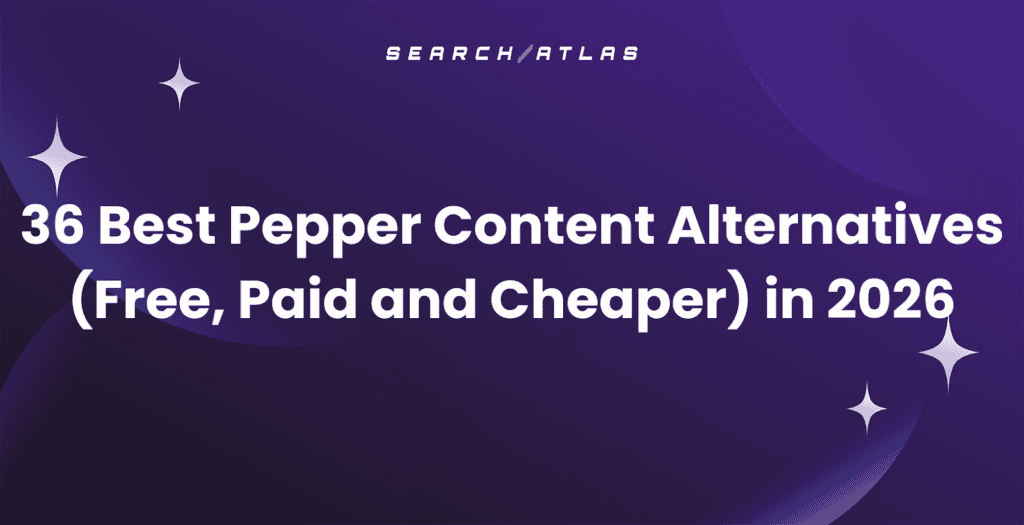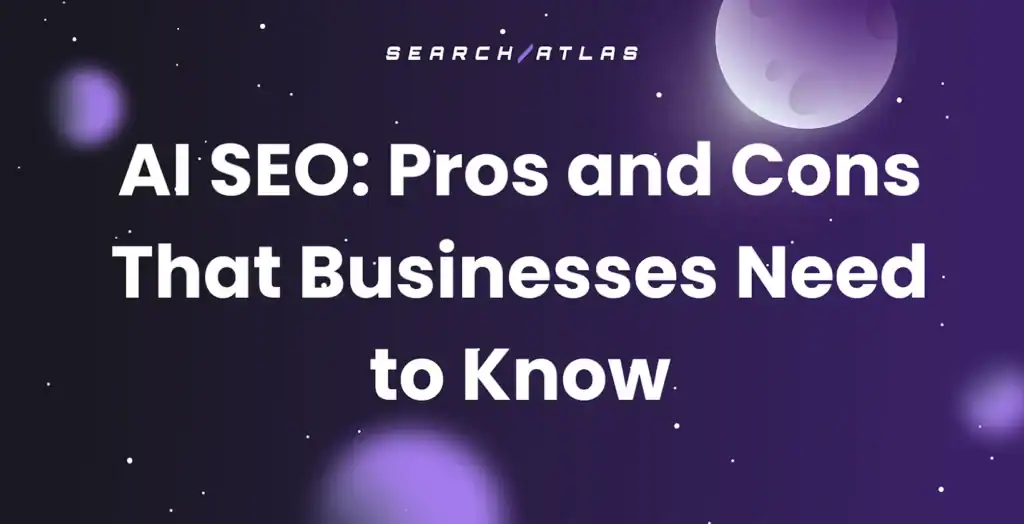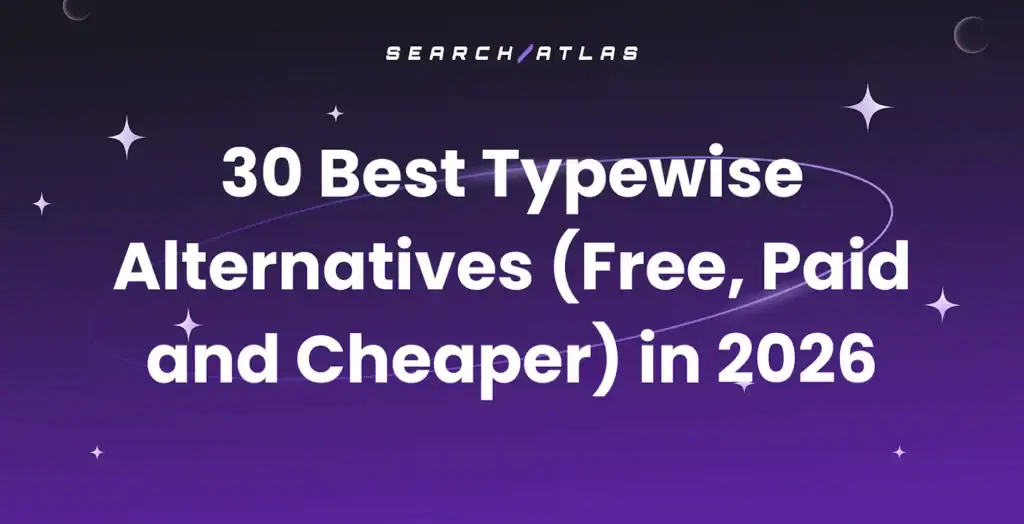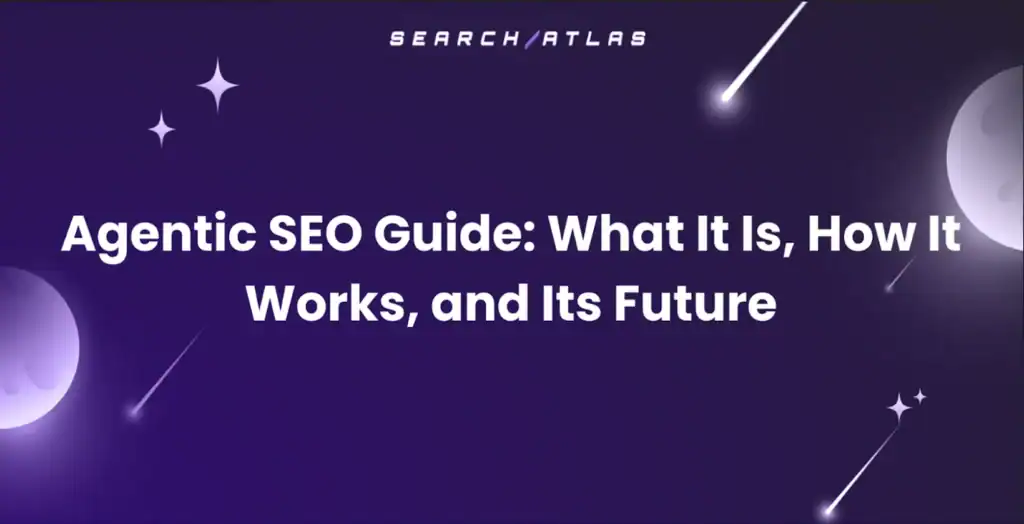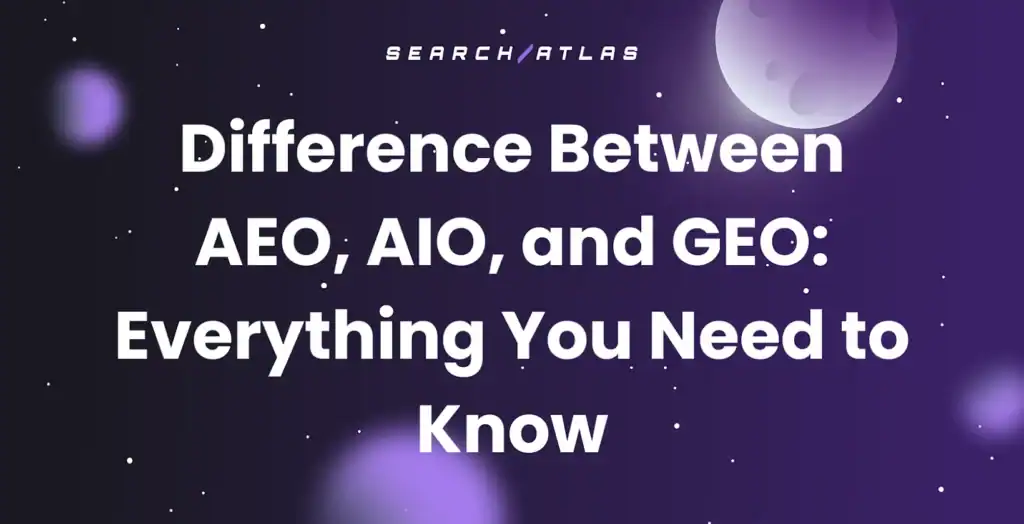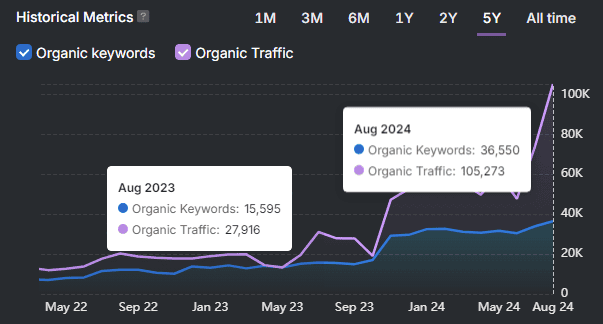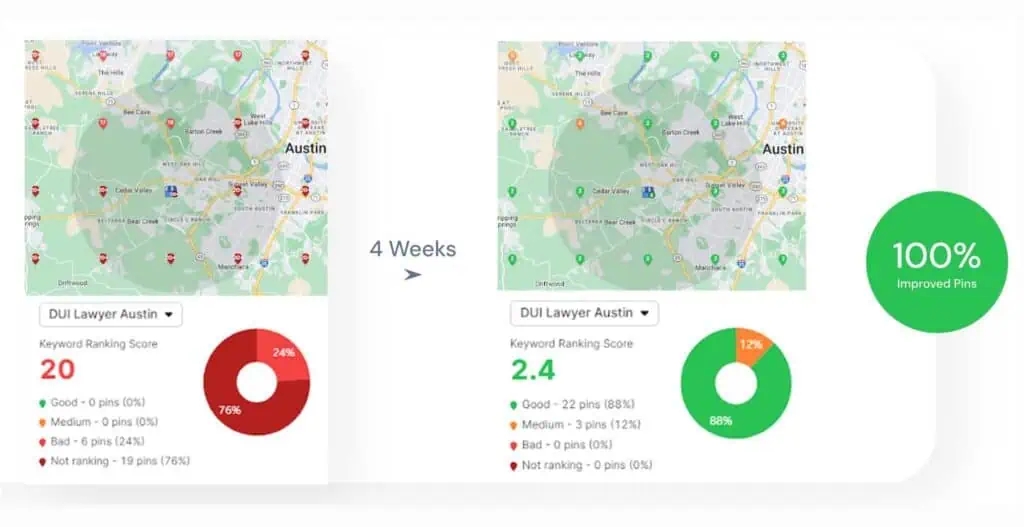White Label SEO is a solution that allows agencies and marketers to deliver SEO services under their own brand using external tools or platforms. Instead of outsourcing to third-party providers, agencies manage campaigns, generate branded reports, and deliver results using specialized SEO software, all while maintaining full control over the client experience.
The goal of White Label SEO is to help businesses scale their SEO offerings while preserving brand ownership and client trust. With the right tools, agencies perform keyword research, run site audits, manage backlinks, and track rankings, all within a system that reflects their own branding and workflows.
White Label SEO is essential for growth-focused agencies because it enables them to expand service capabilities, deliver high-quality results, and protect brand identity while operating more efficiently. This guide will explain how White Label SEO works, how it differs from traditional SEO services, and how agencies use tools to provide expert-level SEO at scale.
What Is White Label SEO?
White Label SEO is the practice of offering SEO services to clients under an agency brand while using third-party tools or platforms to perform the work. These tools handle tasks like site audits, keyword tracking, content optimization, and reporting, but everything is presented as if it comes directly from your agency.
Instead of outsourcing SEO execution to external vendors, agencies use White Label SEO tools to manage and deliver SEO campaigns internally. This setup gives agencies full control over the process and brand experience, while saving time and resources otherwise spent on hiring, training, or custom development.

What does White Label SEO Include?
There are different The process of delivering SEO through a White Label SEO tool typically includes.
- Brand customization: The platform is personalized with the agency name, logo, and branding to ensure all client-facing materials reflect the intended identity.
- Client organization: Client websites and accounts are added and organized within the tool for efficient management of multiple campaigns.
- Site audits and keyword analysis: Automated audits scan client sites for technical issues while keyword research identifies opportunities to guide the SEO strategy.
- Task coordination and execution: SEO activities such as on-page optimization, link building, and content planning are assigned, tracked, and managed centrally within the platform.
- Performance monitoring: Real-time data on keyword rankings, backlinks, site health, and organic traffic provides ongoing insights into campaign effectiveness.
- Branded reporting: Reports with agency branding are generated to clearly communicate results and progress to clients.
- Client communication: Updates, reports, and recommendations are delivered through branded dashboards or portals to maintain transparency and reinforce agency professionalism.
This tool-based approach gives agencies the ability to scale services, maintain brand consistency, and simplify delivery without needing a full in-house SEO team.
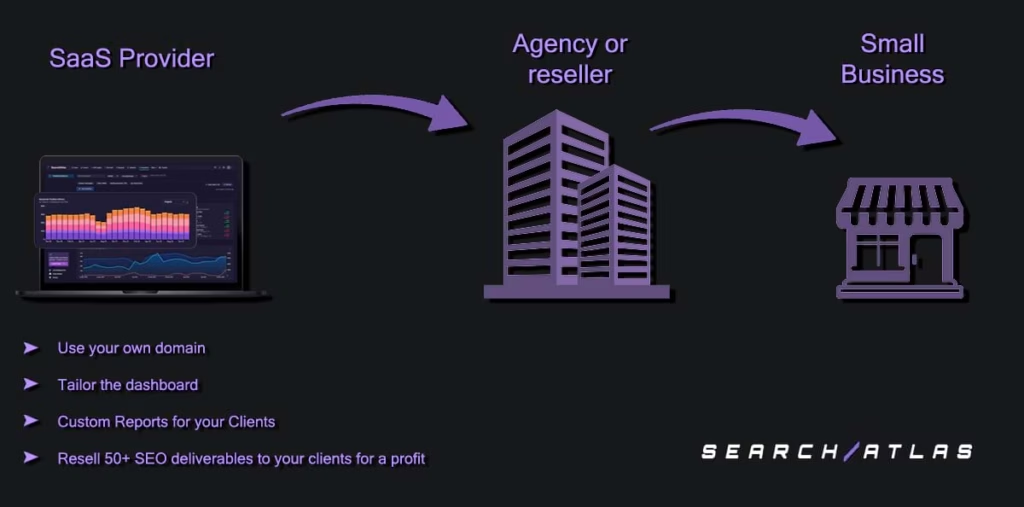
What is the Difference Between White Label SEO vs. Traditional SEO Services?
The main difference between White Label SEO and traditional SEO lies in how the work is delivered and who the client sees as the service provider. In traditional SEO, everything is transparent. The client knows exactly who is managing their campaign, whether it’s an internal team or a dedicated SEO agency. Communication is direct, and the agency maintains full control over strategy, execution, and reporting. This setup allows for close collaboration, faster feedback, and a stronger working relationship between the agency and client.
White Label SEO, in contrast, operates behind the scenes. The agency presents SEO services under its own brand, but the actual work is completed by an external provider. The client doesn’t see the third party. They interact solely with the agency, receiving reports, content, and recommendations that appear fully branded. This allows the agency to focus on client relationships and strategy while the technical work is handled quietly in the background.
While traditional SEO offers transparency and hands-on control, White Label SEO is designed for scalability and efficiency. It enables agencies to expand their service offerings, reduce operational costs, and maintain a consistent brand experience for clients without hiring or training an internal SEO team.
What are the Challenges of White Label SEO?
White Label SEO offers a powerful solution for scaling services, but presents unique operational and strategic challenges. Agencies that rely on third-party execution must navigate these carefully to maintain trust, efficiency, and quality across their client base.
There are different challenges for white label SEO. The different challenges for white label SEO are listed below.
- Maintaining Brand Consistency and Service Quality: Work executed by an external provider makes it difficult to ensure deliverables align with agency tone, standards, and brand expectations. From formatting to reporting style, even small inconsistencies create friction with clients who expect a flawless brand experience.
- Managing Client Communication and Expectations: Your agency acts as the face of the service, but it doesn’t directly control the backend execution. This disconnect complicates timelines, reporting, and campaign adjustments. It’s essential to set realistic expectations and maintain proactive communication to avoid confusion or disappointment.
- Staying Current with SEO Trends and Adaptability: SEO is a fast-moving discipline that requires constant updates to strategy. While White Label providers stay current with changes, your agency still needs to translate that knowledge to clients. Relying too heavily on a provider leads to gaps in your ability to adapt strategies or respond confidently to client questions.
- Protecting Confidentiality and Ensuring Data Security: Working with third parties means sharing sensitive client data. Lack of strict data protection practices by providers increases the risk of breaches or compliance issues. Agencies must ensure their White Label partners have robust protocols in place to handle and store data securely.
- Coordinating Workflow and Tool Integration: Many agencies have existing systems for client management, task tracking, and reporting. White Label tools and workflows often lack perfect alignment, leading to inefficiencies or duplication. Smooth integration is key to maintaining a smooth operation and delivering timely, accurate results to clients.
What are the Benefits of White Label SEO?
Despite the operational considerations, the benefits of White Label SEO far outweigh the challenges for most agencies. It offers a simplified path to growth, scalability, and service expansion without the overhead and complexity of building an in-house SEO team from the ground up.
There are different benefits for white label SEO. The different benefits for white label SEO are listed below.
- Scale services efficiently: White Label SEO lets agencies serve more clients without increasing headcount. Campaigns run simultaneously across multiple accounts, allowing your agency to scale faster while maintaining quality through reliable systems and workflows.
- Focusing on core business: With execution handled by a third party, your internal team prioritizes client strategy, account management, and business development, areas that directly influence long-term growth.
- Reduced costs: Operating without the fixed costs of full-time SEO specialists, agencies deliver quality results while preserving healthy margins. You only pay for what you need, making it a flexible and cost-effective alternative to hiring.
- Expanding service portfolio: Agencies that previously focused on design, ads, or web development now offer complete SEO solutions. With White Label tools supporting the backend, it becomes easy to offer keyword research, audits, content, and link-building as part of your core services.
- Improving client satisfaction and retention: Clients expect measurable results. Consistent delivery of SEO gains, backed by timely reports and clear insights, improves client satisfaction. This builds trust, which leads to higher retention rates and long-term contracts.
- Saving time: Execution is improved, and many White Label platforms automate technical tasks like site audits, keyword tracking, and reporting. This cuts down on manual work while helping you deliver results to clients more quickly.
- Building your brand with quality SEO offerings: Since all client-facing deliverables are branded as your own, your agency earns the credit. From white-labeled reports to branded dashboards, you maintain full ownership of the client experience while offering best-in-class SEO execution behind the scenes.
- Increasing revenue: Adding SEO as a service line opens new revenue streams. Whether bundled into existing packages or sold as a standalone offering, SEO creates opportunities for higher-value engagements without significant investment.
While many agencies rely on outsourced execution, the most sustainable and scalable path often involves using Search Atlas White Label SEO Software. This platform provides full control through a branded workspace. Audits, campaign execution, and SEO reports are delivered all under the agency name. With advanced features and automation baked into the system, it becomes easier to offer high-quality SEO services without compromising brand integrity or operational efficiency.
What is a White Label SEO Tool?
A white label SEO tool allows agencies to offer SEO services under their own brand. It tracks keyword rankings, audits websites, monitors backlinks, and generates reports. It automates technical tasks, applies on-page recommendations, and organizes content strategies. It presents results through branded dashboards and SEO reports for clients. Agencies manage multiple clients without revealing the original tool provider. This builds trust, improves efficiency, and strengthens brand presence in SEO service delivery.
How to Choose the Best White Label SEO Tool?
There are 10 factors to consider when choosing a white label SEO tool. The 10 factors to consider when choosing a white label SEO tool are listed below.
- Service Capabilities: Assess the scope of SEO functions the tool offers. Look for site audits, keyword tracking, backlink analysis, content optimization, and local SEO features. A comprehensive tool saves time and reduces the need for multiple platforms.
- Ease of Use: User-friendly design and intuitive workflows are critical. The platform enables your team to work efficiently without long learning curves or unnecessary complexity. Clean interfaces and clear task flows contribute to better productivity.
- White Label Customization: Look for full branding control. The tool allows applying the agency logo, colors, and domain. This ensures reports, dashboards, and emails reflect the brand identity. This strengthens your credibility with clients and reinforces trust.
- Client and Team Access Controls: Effective role-based access managers who sees what. Your team gets the tools they need without clutter, while clients access progress and reports without exposure to internal details.
- Automated and Custom Reporting: Strong reporting tools prove value. Platforms generate automated, data-rich reports customizable to client priorities. Metrics include keyword rankings, website health, backlinks, and traffic trends.
- Platform Integrations: The tool integrates smoothly with services like Google Analytics (GA4), Google Search Console (GSC), and other marketing platforms. These connections deliver richer insights and support more informed campaign planning driven by real data.
- Ethical SEO Standards: Ensure the platform supports ethical, white-hat SEO strategies. This protects your clients and your agency from penalties and supports sustainable long-term growth.
- Support and Onboarding: Responsive customer support and proper onboarding are essential. Choose a provider that offers clear documentation, training resources, and access to support staff when needed. This reduces friction and keeps your campaigns moving.
- Pricing and ROI: Evaluate the cost structure based on agency size, workload, and growth plans. Look for scalable pricing, transparent tiers, and a return on investment that aligns with long-term client expansion.
- Reputation and Results: Research the track record of the provider. Read reviews, request case studies, and learn how agencies have used the tool to achieve success. A solid reputation is often a sign of reliability and long-term support.
The right white label SEO tool is more than a utility. It becomes the operational engine behind agency SEO services, enabling better outcomes for clients and a more scalable future for the business.
What Are the 5 Main SEO White Label Tools?
There are 5 SEO white label tools to choose. The 5 SEO white label tools to choose are listed below.
1. Search Atlas
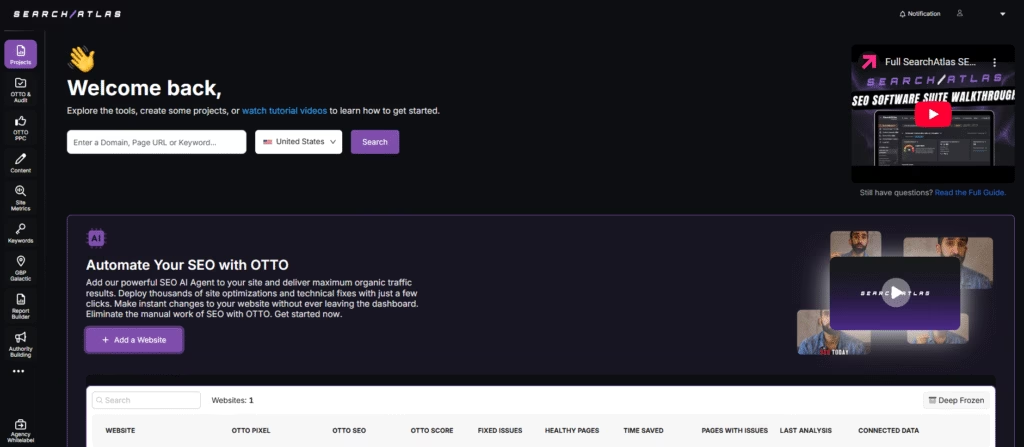
Search Atlas is the most popular white label SEO platform built for agencies that want to keep SEO execution in-house while scaling client services under their own brand. Instead of outsourcing tasks to external providers, agencies rely on the platform’s built-in tools to deliver fully branded, data-driven SEO campaigns.
At the core of Search Atlas lies a fully customizable white label environment. Agencies configure the platform with their own domain, logo, and visual identity. They create personalized dashboards and client reports, ensuring every interaction reflects the agency’s brand. This reinforces credibility and strengthens client trust across all deliverables.
Beyond branding, Search Atlas includes a complete suite of advanced SEO tools. Users run technical site audits and crawl diagnostics, analyze keyword opportunities with real-time data, and optimize content inside the platform. They track backlink growth, evaluate profile health, and benchmark SEO performance against competitors.
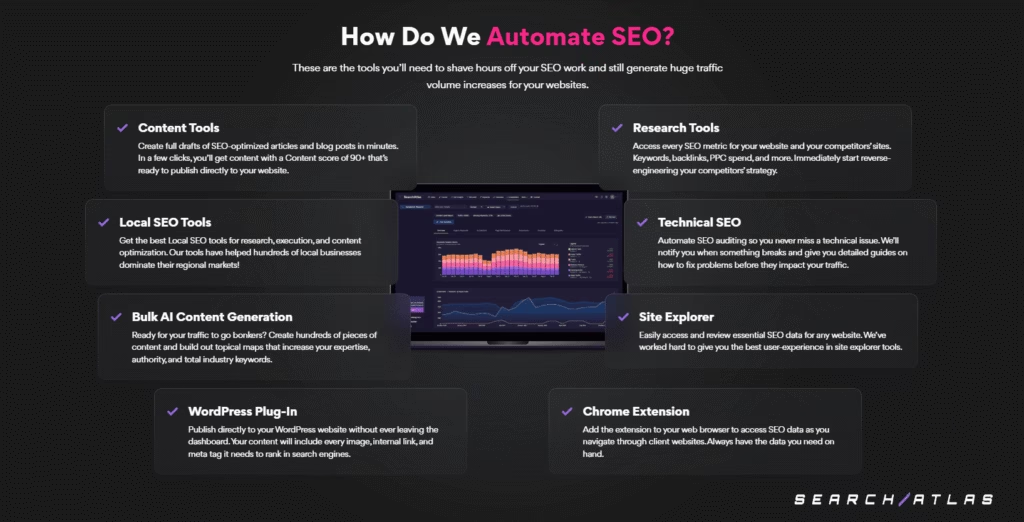
All SEO operations are centralized, which eliminates the need for juggling multiple platforms and helps agencies speed up their workflow.
What truly sets Search Atlas apart is its focus on client-facing value. Agencies generate automated SEO reports with customized visuals, KPIs, and annotations. These reports are easy to schedule or export on demand, making client communication smooth and professional.
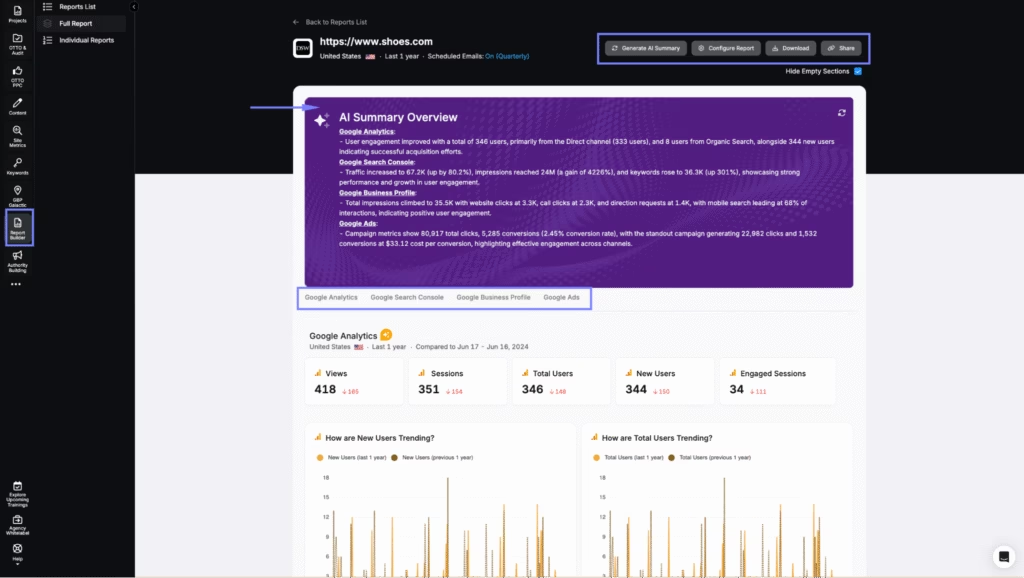
The platform supports collaboration through team access controls and integrates directly with GA4, GSC, and Google Business Profile (GBP). This reduces manual reporting tasks and provides real-time performance insights that clients access through branded portals.
Search Atlas is a great fit for agencies that want full control over SEO campaigns, professional client presentation, and scalable operations without outsourcing. It gives teams full control of the work while keeping all credit and spotlight on the brand.
2. DashClicks
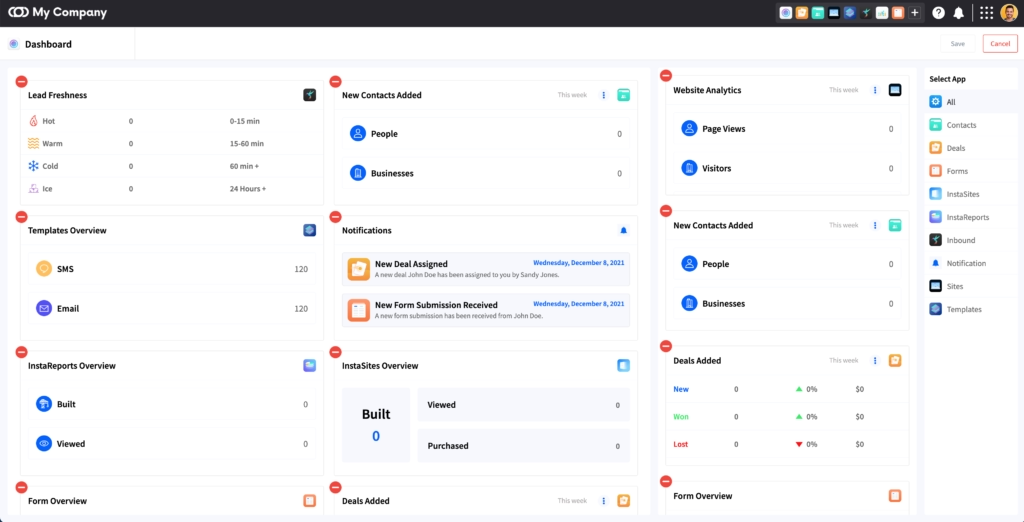
DashClicks is an all-in-one digital marketing platform built to help agencies manage SEO alongside PPC, social media, and other marketing services. DashClicks white label SEO features allow agencies to maintain full branding while automating essential SEO tasks and reporting. The platform supports keyword tracking, on-page SEO audits, and backlink monitoring, making it a versatile choice for agencies looking to offer a broad range of services from one dashboard.
DashClicks includes several key features that streamline agency operations. It offers automated client reporting with customizable templates, CRM and project management integration for a unified workflow, and built-in tools for lead generation and client management. Its multi-channel marketing capabilities allow agencies to handle campaigns across SEO, paid media, and social from one platform.
While DashClicks provides a strong foundation for full-service marketing agencies, its SEO tools lack the depth of specialized platforms. It serves best as a solution for agencies that want to include SEO as part of a broader digital offering rather than prioritize SEO as a core focus.
3. AgencyAnalytics
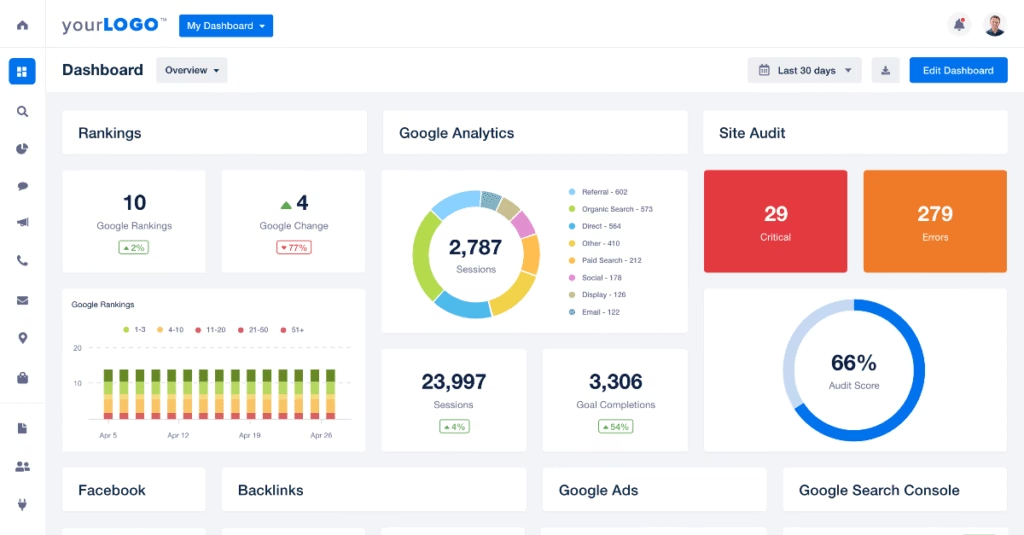
AgencyAnalytics is a white label platform focused on reporting, built to help agencies present SEO and marketing data in a clear, client-friendly format. It aggregates insights from multiple sources and delivers them through customizable dashboards and automated reports. Agencies choose it for its simplicity, visual clarity, and ability to streamline client communication.
The platform integrates with tools like GA4, GSC, and various SEO and PPC platforms. Its drag-and-drop dashboard builder enables fast personalization, while automated report scheduling ensures consistent client updates. Agencies track backlinks, keyword rankings, PPC performance, and social media metrics all in one place.
While AgencyAnalytics excels in reporting, it lacks built-in SEO execution features such as keyword research, site audits, and content optimization. Agencies often pair it with specialized SEO platforms to fill those gaps and offer a complete, end-to-end SEO service.
4. Wincher
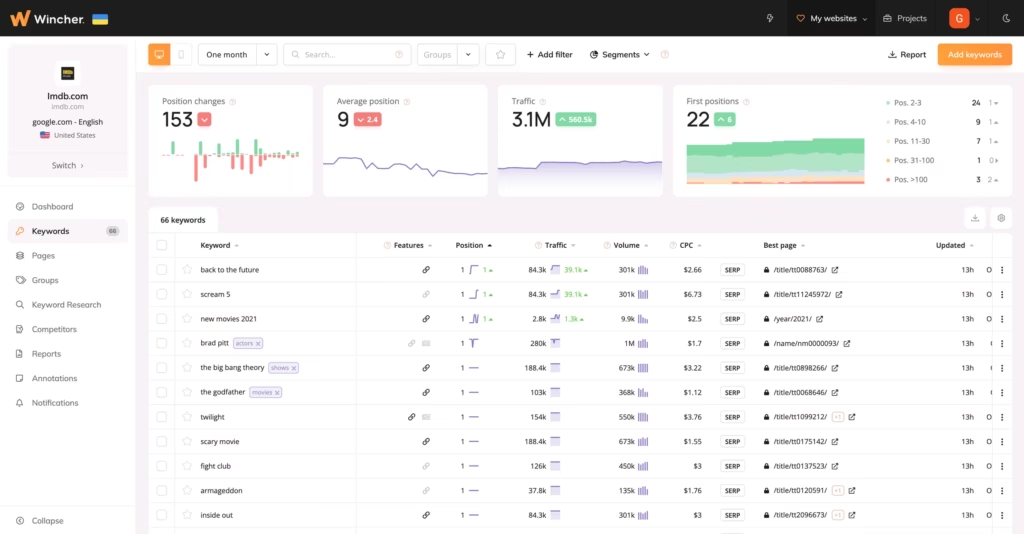
Wincher is a specialized white label SEO tool that focuses exclusively on keyword rank tracking. It offers agencies a streamlined solution for monitoring keyword performance without the complexity of full-suite SEO platforms. Its focused functionality and ease of use make it ideal for agencies that want precise ranking insights and straightforward reporting.
The white label features include branded PDF and web-based reports, custom logos, and branded email delivery. While client portal customization remains limited, the platform still delivers a consistent branded experience.
Wincher provides daily keyword ranking updates with historical trend data, basic on-page SEO scoring, and competitor rank tracking tool. However, it does not include robust backlink analysis or advanced site auditing tools. Reporting automation is built-in, allowing agencies to schedule and send reports with minimal effort.
5. WebCEO
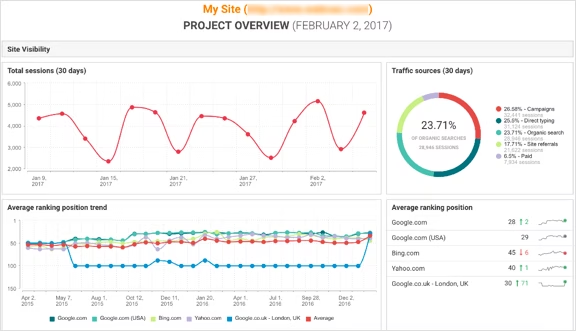
WebCEO is a comprehensive suite of SEO tools built with agencies in mind, offering an extensive range of features for SEO management and client reporting. Its platform supports full-service SEO delivery while allowing agencies to present their work under their own brand through robust white label capabilities.
Agencies customize reports, dashboards, and domains with their own branding and grant clients access through a white labeled portal. Reports and email communications feature full branding customization, ensuring a seamless agency-client experience at every touchpoint.
The platform delivers core SEO functionality across all major areas. It includes keyword rank tracking across multiple search engines, detailed technical SEO audits with actionable recommendations, backlink checking and analysis, and competitor benchmarking. Agencies automate reporting through scheduled deliveries, enhancing efficiency and transparency.
Is White Label SEO Worth it?
Yes. White label SEO is worth it for agencies that want to scale efficiently, retain full brand control, and deliver professional SEO services without building everything from scratch. It eliminates the need to hire in-house experts for every task, reduces overhead, and allows faster onboarding of new clients. Agencies maintain their brand identity across reports, dashboards, and communications, which strengthens client trust and loyalty. With automation and ready-made tools, white label SEO accelerates service delivery, improves consistency, and increases profit margins while focusing internal resources on strategy and client relationships.



